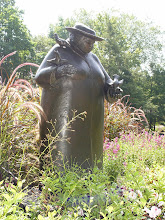The first robins showed up a few days ago, and judging by all the singing, twittering, and general avian sounds emanating from every tree, shrub, fence, wire, and gutter in the neighborhood, we should start seeing baby birds in the not-too-distant future. But before that can happen, the parents-to-be of most species need to build some nests, a process that requires building materials.
Most of our common songbirds (and quite a few others) use small twigs and dried grass as the basis for their nests, but such things are in short supply in overly-manicured neighborhoods. Some humans try to compensate by leaving materials such as pet hair, dryer lint, and short pieces of yarn or twine where birds can find them, but the Cornell Lab of Ornithology advises against these items. What our birds need is more of this.
If you have managed to avoid completing your fall (ha!) yard cleanup, now is a good time to cut those clumps of dead grass and leftover plant stems and use them to create an avian Home Depot. These in-demand items can be placed in suet cages and hung in likely spots, or just left in piles on the ground if no neighbors object. They will be put to good use.
Once the babies arrive, they will need food, which generally means caterpillars or small insects, with baby hummingbirds being particularly fond of nearly-microscopic flies and gnats. The average brood of baby chickadees will need anywhere from 6000-9000 caterpillars or other insect larvae before they can leave the nest, with other species being similarly voracious. Multiply that number by the number of bird pairs in your area, and the need for insect-friendly habitat becomes obvious.
This planting is only one example of an insect- (and therefore bird-) friendly flowerbed: native plants with landing pads, nectar, pollen, and eventually lots of seeds.
Put something like this near trees and shrubs, and your yard is going to make the birds and the bees very happy.



No comments:
Post a Comment